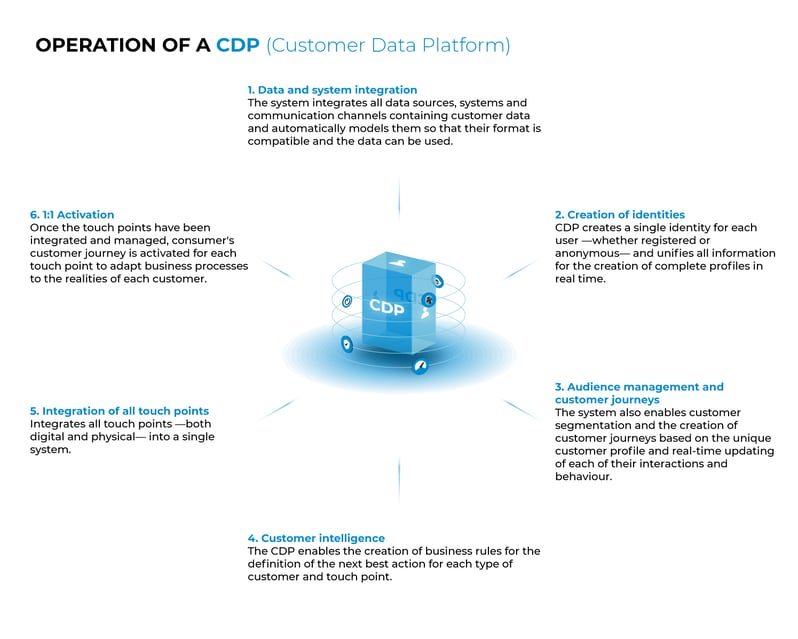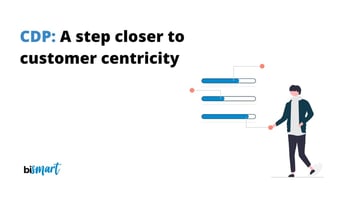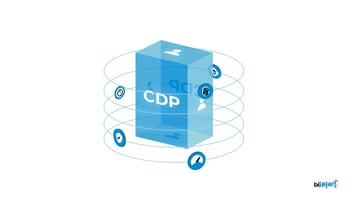At Bismart we are specialists in the implementation of Customer Data Platform (CDP), the ideal tool for managing customer data.
Customer data management has become one of the focal points of business strategies and is already one of the most decisive factors in ensuring the success of a company. At Bismart, we are specialists in the development and implementation of Customer Data Platform (CDP), the only tool capable of solving the problems related to customer data.

In the las few years customer data has established itself as the most powerful data asset. Subordinating business operations and processes to customer needs is already one of the most important business trends of recent times. This new business philosophy falls under the customer-centricity umbrella, which is based on placing the customer at the centre of all business decisions.
At the end of 2019, a research by Econsultancy already pointed out that 68% of business leaders consider the customer-centric perspective to be the most relevant strategy for the future. This is no coincidence. The purpose of this approach is to deliver better customer experiences, services and customer care through personalisation.
Far from being a one-way conversation, studies reveal that it is the customers themselves who are demanding personalised experiences. According to a recent Infosys report, 86% of customers say that personalisation influences their shopping process and 31% directly confirm their preference for personalised shopping experiences.
Although everything suggests that customer knowledge and personalisation are leading companies' main focus; in practice, their implementation is less tangible than it should be, with most organisations failing to apply customer-centric processes (MarketingProfs) and 62% of consumers claiming that companies do not understand their needs (PWC).
Data fragmentation: companies Achilles' heel
The prevailing mismatch between theory and practice lies in the very same problem that prevents many companies from establishing a data-driven culture: data fragmentation.
Far from being a uniform entity, customer data is generated in multiple business areas and spread across multiple databases. In other words, under current corporate operations, customer data is generated and collected in different data silos that are rarely shared. Organisations operate on a departmental basis and most of them interact with clients in one way or another. Each department has its own databases, files, reports, dashboards and so on. Furthermore, business areas use different technologies and tools that make it difficult to share data, which is often in disparate formats.
All of this draws a scenario in which customer data is split into fragmented and generally incompatible silos, resulting in different segments of information about the same customer. On the one hand, this prevents companies from taking advantage of their data and, on the other hand, it makes it impossible to obtain a unified single customer view and to create 360º customer profiles.
This is also why companies spend most of their time processing data before they can use it for process and operational optimisation and the generation of integrated personalisation strategies and campaigns. According to Gartner, marketers spend much of their time on data integration because customer data is held in multiple sources. In addition, data scientists and analysts spend 80% of their time on data processing and only 20% on data analytics.
Solving the problem: Customer Data Platform (CDP)
All of the above can be solved by means of an appropriate customer data management strategy. For some time now, technology providers have been trying to unblock this bottleneck with customer relationship management tools such as CRM systems or data management platforms (DPM). However, it was not until the emergence of the Customer Data Platform (CDP) that the solution to the problem has been found.
What is it?
A Customer Data Platform (CDP) is a customer relationship management system that centralises all consumer data collection processes, integrating them into a single repository that allows companies to create 360° customer profiles and create integrated campaigns across all channels and touch points.
The great advantage of the Customer Data Platform is that it overcomes the limitations of other similar systems such as CRM, the Enterprise Data Warehouse or Data Management Platforms. These tools, although they have facilitated customer relationship management (CRM) and the creation of audiences (DMP), have perpetuated data fragmentation.
To make matters worse, CRM systems are only able to collect predefined data from existing customers (i.e. users previously identified in the domain or platform). DMPs, on the other hand, focus on advertising purposes and are highly dependent on third-party cookies and data.
The consolidation of the Customer Data Platform brings us into a new era where building unique and complete customer profiles, fully managing audiences, developing optimal and consistent personalisation strategies and generating the right message for each channel and touch point is not only possible, but also easy and automatic.
How does it work?
A CDP operates in a similar way to a workflow, creating a seamless and multi-systematic data flow. Basically, every time a user —whether it is an existing customer or an anonymous user— interacts in any way with any of our touch points, the CDP generates a unique identifier for that user and automatically collects all previous and future information about them and then distributes it to all corporate systems and platforms. The best part: it does it in real time. To put it simply, it ensures that all the company's departments have all the information updated in real time on each of the customers.
This way, the CDP succeeds in building a single, complete view of each customer by unifying all necessary data processes on a single platform.
 In addition to solving the limitations of other platforms, enabling the creation of 360° customer profiles, unlocking personalisation and optimising customer strategies; Customer Data Platforms also contribute to having higher quality data (data quality), simplify reporting processes and facilitate predictive analytics (on future customer behaviour and needs) and the application of machine learning to enrich customer data.
In addition to solving the limitations of other platforms, enabling the creation of 360° customer profiles, unlocking personalisation and optimising customer strategies; Customer Data Platforms also contribute to having higher quality data (data quality), simplify reporting processes and facilitate predictive analytics (on future customer behaviour and needs) and the application of machine learning to enrich customer data.
All this makes of the Customer Data Platform (CDP) an essential tool for customer-centric and data-driven business transformation.
Customer Data Platform (CDP): Our approach
At Bismart we are experts in the implementation and development of customised CDP systems adapted to the needs and business objectives of each organisation. Our long experience in the creation of solutions and the implementation of data processes has allowed us to develop a vast understanding of how this platform works and to identify the best steps to follow in order to ensure that it is used to its full potential.
We build customised and self-scalable CDPs making sure that all operations and processes related to its implementation comply with the data quality, data governance and business intelligence requirements necessary for the tool to deliver the expected results.
Would you like to receive personalised information about CDPs or have any questions regarding the process? We are here to help you!



